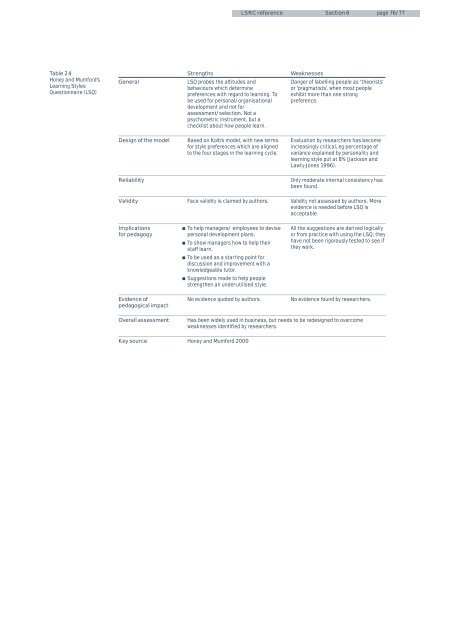learning-styles
learning-styles
learning-styles
Create successful ePaper yourself
Turn your PDF publications into a flip-book with our unique Google optimized e-Paper software.
LSRC reference Section 6<br />
page 76/77<br />
Table 24<br />
Honey and Mumford’s<br />
Learning Styles<br />
Questionnaire (LSQ)<br />
General<br />
Strengths<br />
LSQ probes the attitudes and<br />
behaviours which determine<br />
preferences with regard to <strong>learning</strong>. To<br />
be used for personal/organisational<br />
development and not for<br />
assessment/selection. Not a<br />
psychometric instrument, but a<br />
checklist about how people learn.<br />
Weaknesses<br />
Danger of labelling people as ‘theorists’<br />
or ‘pragmatists’, when most people<br />
exhibit more than one strong<br />
preference.<br />
Design of the model<br />
Based on Kolb’s model, with new terms<br />
for style preferences which are aligned<br />
to the four stages in the <strong>learning</strong> cycle.<br />
Evaluation by researchers has become<br />
increasingly critical, eg percentage of<br />
variance explained by personality and<br />
<strong>learning</strong> style put at 8% (Jackson and<br />
Lawty-Jones 1996).<br />
Reliability<br />
Only moderate internal consistency has<br />
been found.<br />
Validity<br />
Face validity is claimed by authors.<br />
Validity not assessed by authors. More<br />
evidence is needed before LSQ is<br />
acceptable.<br />
Implications<br />
for pedagogy<br />
To help managers/ employees to devise<br />
personal development plans.<br />
To show managers how to help their<br />
staff learn.<br />
To be used as a starting point for<br />
discussion and improvement with a<br />
knowledgeable tutor.<br />
Suggestions made to help people<br />
strengthen an under-utilised style.<br />
All the suggestions are derived logically<br />
or from practice with using the LSQ; they<br />
have not been rigorously tested to see if<br />
they work.<br />
Evidence of<br />
pedagogical impact<br />
No evidence quoted by authors.<br />
No evidence found by researchers.<br />
Overall assessment<br />
Key source<br />
Has been widely used in business, but needs to be redesigned to overcome<br />
weaknesses identified by researchers.<br />
Honey and Mumford 2000


